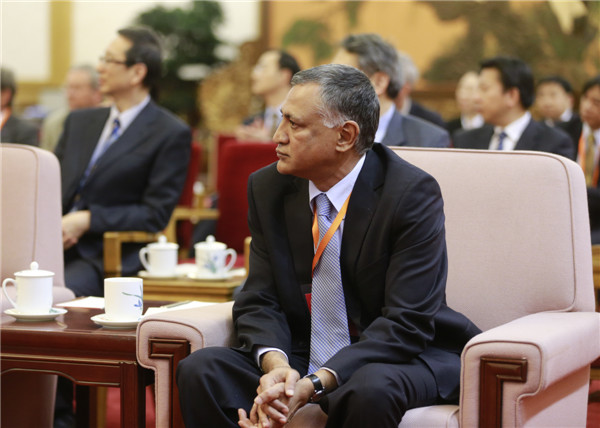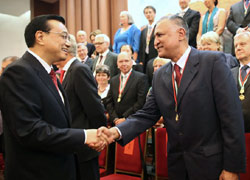Ravi Shankar Narasimhan: Time and place with premier
By Ravi Shankar Narasimhan (China Daily) Updated: 2014-01-23 10:15Editor's note: Ravi Shankar Narasimhan, executive editor of China Daily's overseas editions, was one of 70-plus foreign experts invited to the Great Hall of the People on Tuesday for a symposium and a Chinese New Year dinner with Premier Li Keqiang and senior State leaders.
 |
|
Ravi Shankar, executive editor of China Daily's overseas editions, attends a seminar at the Great Hall of the People on Tuesday. Feng Yongbin / China Daily |
If you ever wondered how official events in China are run like clockwork, I can offer some insight: It takes a lot of time and plenty of attention to detail.
The three buses carrying the 70-odd foreign experts from SAFEA - the easy-sounding acronym for the State Administration of Foreign Experts Affairs - were scheduled to leave the building at 2:45 pm for the 5 pm symposium with Premier Li Keqiang and other senior State leaders. I thought it was a bit too early but our handlers said it was better safe than...
As we crawled through the heavy mid-afternoon Beijing traffic, the abundant caution made sense but even then we arrived a few minutes earlier than scheduled. We would be admitted to the Great Hall of the People only at 4 pm, so we sat in the bus in a side lane.
At the appointed time, the gates and doors were thrown open with a flamboyance seen only in places with a sense of grandeur.
 |
Security was tight but the checks were efficient and quick. Airport security guards could take a cue from here.
There was ample time to locate our designated seats in two grand halls: one for the symposium and the other for the dinner.
As we checked out who was sitting where, we noticed that "Isabel Crook" would be seated next to the premier, and a murmur went around: Who's she?
A little checking around the ban on phones and tablets meant we had to rely on memory and my recollection of stories published in China Daily for the answer: A 98-year-old Canadian anthropologist who did pioneering work in China, taught at Beijing Foreign Studies University and who has spent about 75 years of her life in China.
That's culture, said Volodymyr S. Kovalenko, professor at National Technical University of Ukraine, who has been visiting China for 40 years, admiringly. Wondering if the rest of the world was losing its traditional moorings, he politely inquired about India - my country.
I tried to assure him that despite centuries of invasions we have tried to sort of -keep our sense of culture intact. But I had to admit that the sense of reverence that the Chinese and their leaders have for foreigners who have helped their country is unmatched.
I offered Kovalenko the example of almost every Chinese leader visiting India making it a point to meet the family of Dwaraknath Kotnis (known in Chinese as Ke Dihua) a doctor whose heroic deeds of saving Chinese soldiers during the War of Resistance Against Japanese Aggression (1937-45) being the stuff of legend in China and known to every student. Li met members of the family in Mumbai last year on his first visit to India as premier.
Now that we had cracked the Crook code, I was sharing the story with the energetic Alistair Michie, group business and government adviser of Newland International Communication Group and a consultant to SAFEA, when a buzz went around the room: Please take your seats, the premier is coming.
It was a good 15 minutes before the 5 pm start, but we all obediently went back to our seats, and waited, murmuring to neighbors.
On the dot at 5 pm, the premier walked in briskly. But there was nothing brusque as he greeted the 20-odd people closest to his seat, held their hand for just that second longer and looked them in the eye ... it made us feel important.
- More female officials caught in corruption
- Whampoa veterans recorded with glory
- Police bust 9 terrorist groups in Xinjiang
- Knife-wielding attackers seized in Xinjiang
- New regulation leads to drop in petitioned cases
- Hunan plant shut as probe into lead poisoning begins
- Police boost efforts to combat gambling
- Project offers jobs openings to legal experts
- Experts: Dog meat festival 'illegal'
- Nation looks to upgrade
pipeline networks






